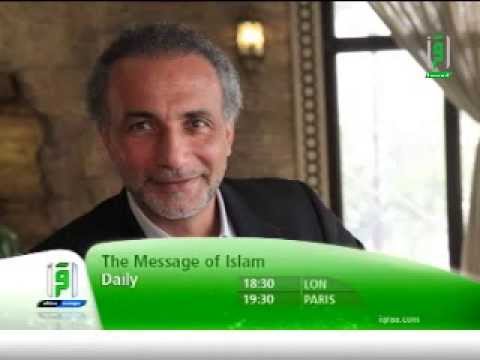Muslim Reformation
Monday, 1st May at 8:00 p.m.
Channel 4
Dispatches: The Muslim Reformation
In this authored film, academic and Islamic reformer Tariq Ramadan examines what the future holds for Islam, one of the world’s most powerful and traditional religions. He presents the case that, despite the attacks on Madrid and London, European Muslims will ultimately determine how the religion survives in the next century.
Travelling across Europe, Prof. Tariq Ramadan examines the issues that are provoking intense debate within the Islamic world – identity, education, the position of women and the understanding of Islamic texts in today’s world.
To bring about any change in Muslim thinking Tariq Ramadan wants to revive an old Islamic concept called IJTIHAD. This means that Koranic text and other Muslim teachings can and should be examined in the context of today’s world.
In France he meets up with a group of young Muslims who are doing just that, reading the Koran and understanding it in a modern context. They look at one of the most controversial chapters in the Koran, verses which Muslim radical groups use to justify their violent attacks and find that these texts are being read out of context.
In Copenhagen, he discusses the explosive impact of the cartoons of the prophet Mohammed with one of the Muslim leaders who organised the demonstrations, Imam Ahmed Akkarri. Whilst in Britain, he visits Shahid Malik MP at his constituency in Dewsbury to see how the large Muslim population is interacting with the wider community and he talks to a group of young men and women about their ideas of identity and religion.
Key to the issue of identity is education and how Muslim children should be educated. In North London Ramadan visits a centre that provides complementary education very different from the traditional Madrassah or religious school, he talks to the parents who give their reasons as to why this system is provides a better religious education for their children.
The status of women within Islam is frequently criticised by the religion’s detractors. Ramadan meets the Muslim men and women who are beginning to make great changes to the traditionally-held views by returning to the Islamic sources and evoking new interpretations that deconstruct the ideas which discriminate against women.
In Germany he goes to meet a group of women who are also involved in this process of Ijtihad and are changing Muslim teachings.
In the last leg of his journey, Ramadan travels to Pakistan to see what impact these changes might bring to he Muslim world. He meets He also meets Ahmed Yar Khan who runs one of largest religious schools in the country, and Mawlana Thanvi leader of one of the most powerful religious political parties in the country.
He finds that the cartoon issue is being used by these parties to attack the government in power and that there is little desire for any change in Muslim thinking, a view which reinforces his opinion that the only place where an Islamic reformation can take place is in Europe and will be lead by European Muslims.





I think it is quite clear that Ijtehad is a perfectly reasonable way of extending the interpretation of Islamic teachings and applying them to a the modern world.
By way of an example internet did not exist at that time so clearly Allah & the Prophet PBUH, could not have commented upon it [as it would not been understood by the followers at that time]. But now that internet does exist it is the duty of our scholars to guide our children how to interact with this medium.
I would therefore say that it is not just ‘RIGHT’ for the scholars to do Ijtehad it is in fact their ‘DUTY’